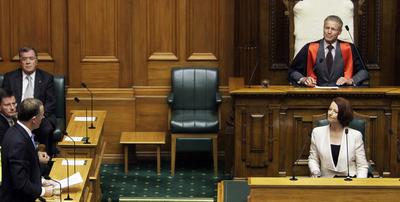New Zealand and Australia have had a Closer Economic Relationship since 1983, of which the declared objective is to create a seamless single economic market. In some respects, such as the movement of labour, it is already an unusually advanced degree of economic integration. But there are always issues such as taxation provisions, entitlements to welfare payments and access for international air services on the bilateral agenda.
More important is the ambition to build the CER into a trans-Tasman approach to the Asia Pacific Region. Australia and New Zealand have many common interests. They also have differences; Australia is interested in the development of grain-fed dairying in China, while New Zealand seeks Chinese partners in the development of a market for grass-fed dairy products. There are even more differences in the security field as Australia concerns itself with security from the North for a medium-term power while New Zealand is much more concerned about economic security. So a mere increase in bilateral investment limits could reasonably be described as trivial. Political timidity is the only reason for maintaining any limits on trans-Tasman investment beyond rules which apply to domestic investment.
Quite recently, there seemed to be prospects of faster movement on the agenda for trans-Tasman integration. Discussion proceeded about a spectrum of integration devices. At one extreme is unilateral adoption by one partner (usually New Zealand) of the rules and institutions of the other (usually Australia). At the other is a fully-fledged trans-Tasman institution with authority extending to both jurisdictions. Intermediate steps include authorisation for joint enquiry and action by national institutions such as those that exist between competition authorities. The trans-Tasman ambitions announced by ministers on a previous occasion included development in contexts such as competition approvals of a ‘trans-Tasman benefit test,’ that is, authority to approve transactions that had a net benefit in Australia and New Zealand as a whole, rather than net benefits in each of Australia and New Zealand separately. Nothing has been heard of this for some time.
Summitry is often about symbolism, and Julia Gillard has certainly attracted popular appreciation in New Zealand. She referred to the manner in which both New Zealand and Australia had recently experienced natural disasters, and while their preparations had been sufficient for them to be able to decline international aid, they both readily accepted trans-Tasman assistance. As Ms Gillard commented, ‘New Zealand alone is family.’ The sentiment is welcome, and it has weight, but I doubt whether it would be made to some Australian audiences where British ancestry is not common. Since the visit, New Zealand has experienced another devastating earthquake, and large scale assistance has been welcomed prominently from Australia and elsewhere, including from Asian partners.
Symbolism may be important for framing the environment in which Australian and New Zealand ministers and officials consider specific issues. New Zealand is able to participate in the Councils of Australian Governments, in which the Federal and State governments seek to coordinate their policies and activities. The tone of the Gillard-Key summit augured well for the continuation of what is a very unusual if not unique collaboration of national and sub-national governments.
So the absence of practical deliverables was not entirely negative. Ms Gillard won applause by conceding the right of New Zealand to export apples to Australia. New Zealanders appreciated the sporting images in her comments:
‘People might give a bit of advice to the umpire along the way, but we abide by the umpire’s decision,’ she said.
‘As a nation we would use those rules and appeal rights as they were made available. The umpire has now spoken we will abide by the decision. We believe in free trade and in its obligations.’
There will be a more general approval of the endorsement of the international trading system, and probably some puzzlement over why a few apples have such political significance in Australia.
Gary Hawke is a Senior Fellow at the New Zealand Institute of Economic Research, Professor Emeritus and former Head of the School of Government at the Victoria University of Wellington, New Zealand.

